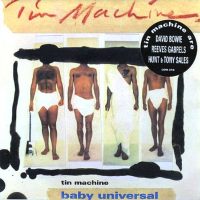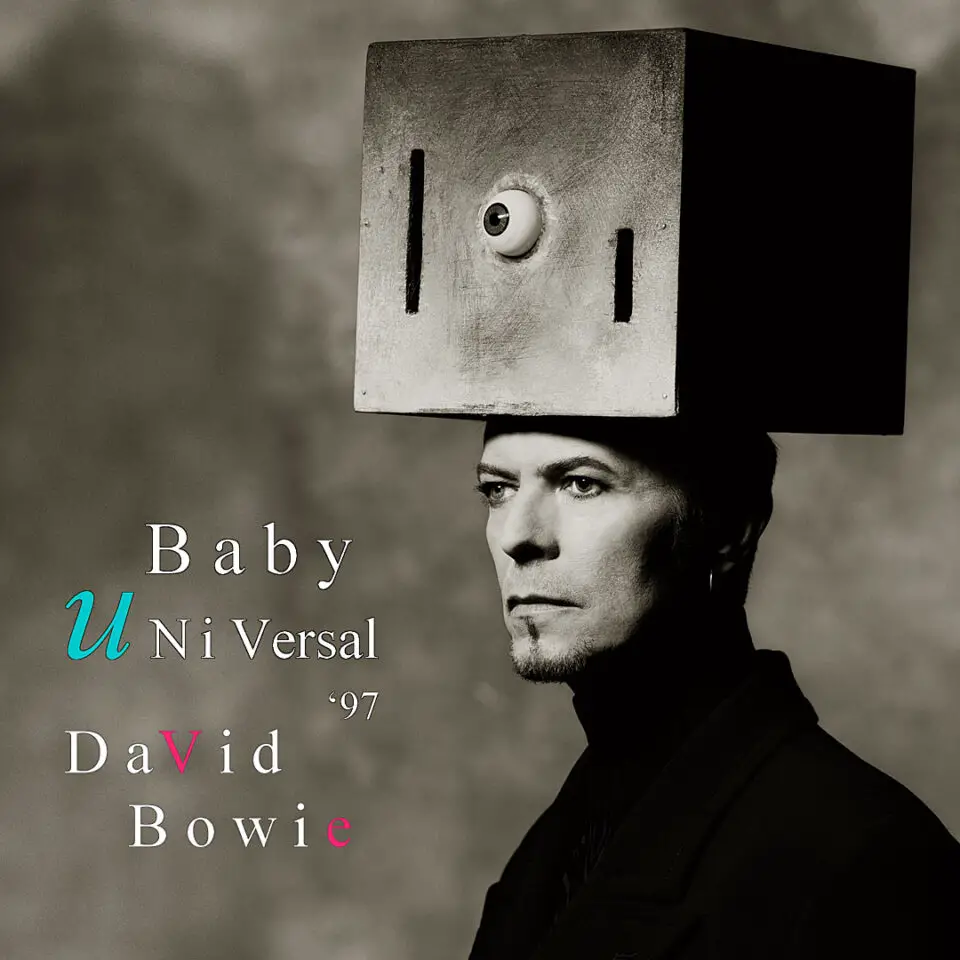 Written by: David Bowie, Reeves Gabrels
Written by: David Bowie, Reeves Gabrels
Recorded: September – November 1989; April, September – October 1990; March 1991; August 1996
Producers: Tin Machine, Tim Palmer; David Bowie, Mark Plati
Released: 2 September 1991
Available on:
Tin Machine II
Is It Any Wonder?
Personnel
Contents
David Bowie: vocals, guitar
Reeves Gabrels: guitar
Tony Sales: bass guitar, vocals
Hunt Sales: drums, vocals
1996:
David Bowie: vocals
Reeves Gabrels: guitar, synthesizer, vocals
Mark Plati: keyboards, programming
Mike Garson: piano, keyboards
Gail Ann Dorsey: bass guitar, vocals
Zachary Alford: drums
‘Baby Universal’ is the opening song on the second Tin Machine album. In 1996 David Bowie and Reeves Gabrels re-recorded it during the Earthling album sessions.
The song was one of the earliest written by Bowie and Gabrels, before the formation of Tin Machine. In the summer of 1988 Gabrels spent a month with Bowie in Switzerland, primarily working on a reimagining of ‘Look Back In Anger’, but also writing several new songs.
When it came to the guitar parts, we thought about them in terms of architecture – Gothic spirals of sound. This is where the art-school background really helps, because we rarely speak in musical terms. He and I were writing part of the songs that would go on to become Tin Machine songs – ‘Heaven’s In Here’, ‘Baby Universal’ (we had a rough version of that without vocals), ‘Baby Can Dance’, ‘Bus Stop’.
Strange Fascination, David Buckley
The video for ‘Baby Universal’ contained archive footage of the band, plus live shots from their Los Angeles Airport show on 25 August 1991. The concert was recorded for the ABC network’s In Concert TV series.
‘Baby Universal’ has so many interesting textures and sounds, from the beginning – from the interplay between the vocals to the powerful, straightahead rock ‘n’ roll backing track. I just love it. And Reeves’ solos are these sort of extended legato notes that disappear into feedback in the chorus, giving it this haunting, otherworldly feel, with David’s lyrics. It’s just a special moment for Tin Machine and one of my favourite things on the album. To me it’s a classic Bowie pop song, but it is Tin Machine. You can clearly hear the influence of Hunt and Tony in the way the rhythm section is executed.I think it’s some of my favourite guitar playing from Reeves, less of the histrionics and more of the melodic. He plays these wonderful extended notes – distorted guitar notes – in the chorus, with the harmony, that just work so well with David’s lyrics. And David singing, ‘Hello humans, can you hear me thinking?’ always makes me think of ‘Space Oddity’, ‘Life On Mars?’ and that otherworldly feeling that you get from those earlier, classic songs.
I think it was slightly overlooked, to be honest. It was such a strong song and performance from the band.
David Bowie: Ultimate Record Collection (Uncut)
The release
‘Baby Universal’ was released on 2 September 1991, as the opening track on Tin Machine II.
The following month the song was issued as Tin Machine’s penultimate single.
The 7″ version reduced ‘Baby Universal’ from 3:19 to 3:07. An extended version of ‘You Belong In Rock N’ Roll’, lasting 6:32, was on the b-side.
The single was also released in a number of additional formats. A 12″ single contained an extended 5:49 version of ‘Baby Universal’, and recordings of ‘A Big Hurt’ and ‘Baby Universal’ from an appearance on Mark Goodier’s BBC Radio 1 show on 13 August 1991. The format also came with a poster of the album artwork.
A CD single contained the 7″ version of ‘Baby Universal’, and the BBC versions of ‘Stateside’, ‘If There Is Something’, and ‘Heaven’s In Here’.
In Japan, the CD contained ‘Baby Universal’ (7″ version), ‘Amlapura’ (Indonesian version), ‘Shakin’ All Over’ (live), and ‘Baby Universal’ (extended version).
In the USA a promotional CD was circulated which contained the 7″ edit, extended version, and BBC recording of ‘Baby Universal’, and the BBC version of ‘Stateside’.
1996 version
David Bowie revived ‘Baby Universal’ during the 1996 Outside Summer Festivals Tour, a rarity for Tin Machine songs.
Later that year he re-recorded ‘Baby Universal’ during the sessions for Earthling. Another Tin Machine song, ‘I Can’t Read’, was also recorded during the sessions.
Both songs were left off the album, however. The retitamled ‘Baby Universal ’97’ was eventually until the Is It Any Wonder? EP. The song was unveiled on 31 January 2020.
DAVID BOWIE IS IT ANY WONDER? STREAMING EP OF UNRELEASED & RARE MATERIAL‘BABY UNIVERSAL ’97’ (PREVIOUSLY UNRELEASED) AVAILABLE NOW
FOURTH OF SIX TRACKS TO BE RELEASED OVER SIX WEEKS
‘BABY UNIVERSAL ’97’ is now available for streaming as the fourth of six tracks making up DAVID BOWIE’s IS IT ANY WONDER? EP (Parlophone) of unreleased and rare tracks being released once a week.
With lyrics by David and music co-written by David and Reeves Gabrels, ‘Baby Universal’ was initially recorded by Tin Machine for Tin Machine II. Released as the band’s penultimate single in October 1991, it was performed during the final Tin Machine US television appearance on Saturday Night Live.
‘Baby Universal’ was regularly performed on Bowie’s ‘Outside Summer Festivals Tour’ in 1996. The version now being released as ‘BABY UNIVERSAL ’97’ was re-recorded for the Earthling album, originally intended to be sequenced between ‘I’m Afraid Of Americans’ and ‘Law (Earthlings On Fire)’. The song was ultimately removed from the final album master, but David was very fond of this version and before the track was dropped was quoted as saying: “I thought ‘Baby Universal’ was a really good song and I don’t think it got heard. I didn’t really want that to happen to it, so I put it on this album… I think this version is very good.”
‘BABY UNIVERSAL ’97’ is produced by David Bowie, co-produced by Reeves Gabrels and Mark Plati. It was recorded at Looking Glass Studios and mixed by Mark Plati at Right Track Recording, both in New York. The track features Gail Ann Dorsey on bass and vocals, Mike Garson on piano/keyboards, Mark Plati on programming/keyboards, Zachary Alford on drums and Reeves Gabrels on guitar, synths and vocals.
31 January 2020

